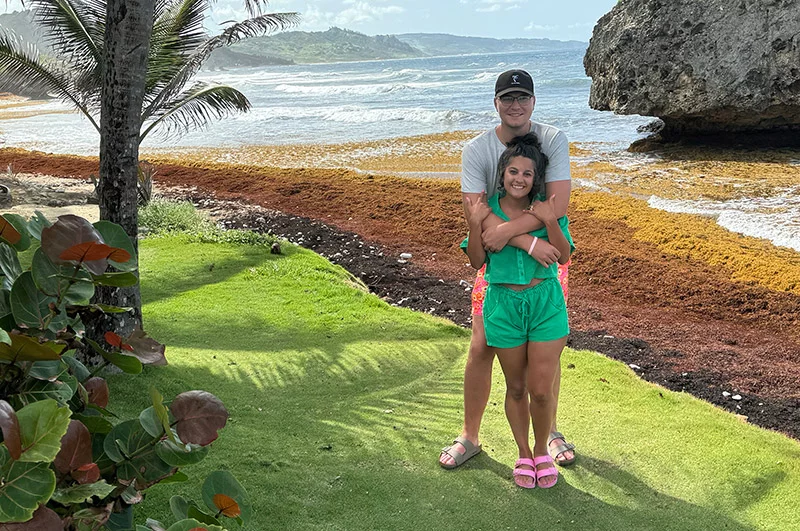
As a college athlete, Haley Shirley spent a lot of time on the sidelines as a cheerleader for her alma mater, the University of Kentucky Wildcats.
In the years since, there’s been a role reversal as Haley’s husband and family have become her biggest fans, supporting her as she went through a breast cancer diagnosis when she was only 24.
“It was hard to comprehend at first,” said Haley’s husband Braden. “Why does someone so young, who does all the right things to take care of herself, get diagnosed with breast cancer? It was so difficult to wrap my brain around. But Haley never asked ‘Why,’ and she took this head-on with no hesitation or doubt that she was going to beat this diagnosis.”
A Pueblo native, Haley returned to her hometown – and her high school sweetheart, Braden – after college. A dental hygienist, Haley was planning a summer 2023 wedding. But in late December 2022, she had some pain in her right armpit.
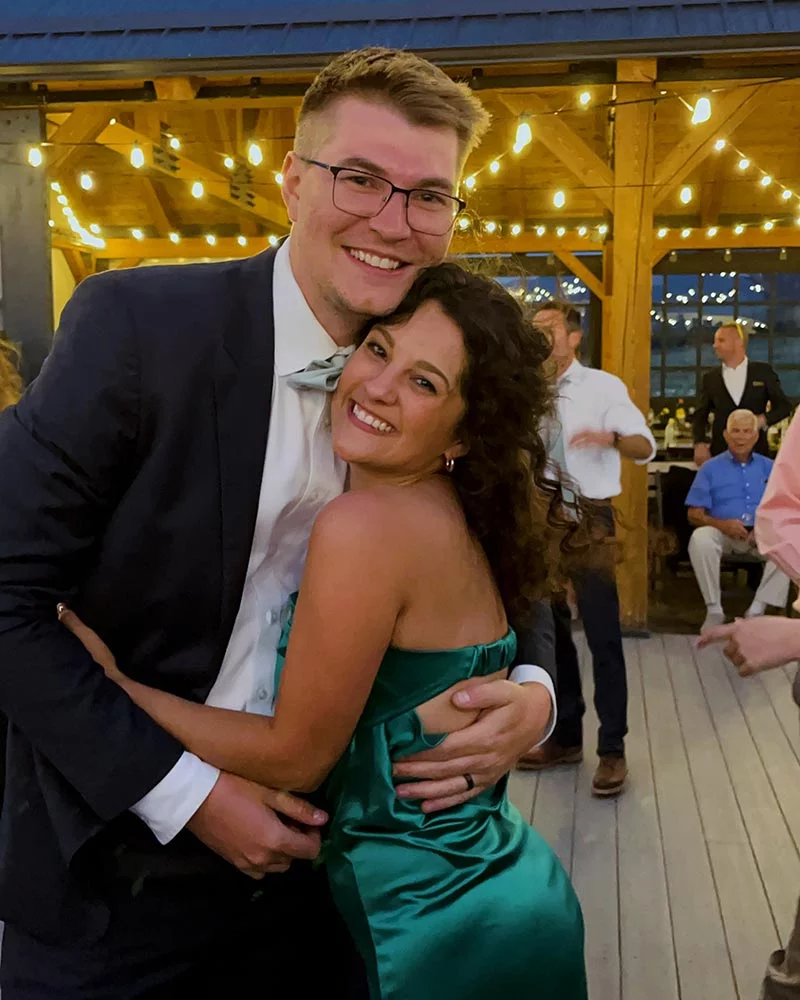
Haley wasn’t too alarmed. During Haley’s annual OB-GYN visit a few months prior, her doctor performed a breast exam. But after Haley felt the pain in December, things progressed quickly. Within 24 hours, Haley felt a lump, and in the next few days, she received an ultrasound, a mammogram, an MRI and a biopsy.
Then came the tough diagnosis. At only 24, Haley had stage 1 invasive ductal carcinoma IDC, a type of breast cancer that has spread from the milk ducts to the breast tissue and surrounding lymph nodes. Her cancer was a “grade 3,” meaning it was aggressive and apt to grow quickly; fortunately, it also was a type that responded well to treatment.
Still, for Haley, an athlete who kayaks, swims and doesn’t drink or smoke, the news was devastating.
“You don’t typically hear about young women getting breast cancer. I had no family history of it, and it was really shocking. After it sunk in though, I felt I wasn’t going to let cancer take me, and I was going to do everything I could to fight.”
Breast cancer in young women like Haley
Breast cancer in young women is more tenacious and typically more dangerous than when it occurs later in life. Women 45 and younger account for about 10% of new cases of breast cancer in the United States, according to the U.S. Centers for Disease Control and Prevention.
Seventy-five percent of women who develop breast cancer, Haley included, have no family history of it. She was lucky she sought help early on, as typically, 40 is the age recommended by medical experts for a baseline mammogram (though women with a family history of breast cancer should speak to their doctor about whether to get one earlier).

Younger women have a higher mortality rate from breast cancer because it is usually not caught as early as women 40 and older who receive annual mammogram screenings. Also, breast cancer in younger women more commonly contains more aggressive biological features than in older women, for reasons doctors are currently researching.
While eating well, exercising and living a healthy lifestyle like Haley has always done are beneficial to reducing the risk of cancer, healthy habits do not guarantee that people will stave off cancer.
In Haley’s case, it was helpful that Braden’s mother was a nurse navigator and helped Haley negotiate her way through treatment decisions while helping her interpret test results and manage appointments, especially in the early days when she was still processing the news.
“There was a learning curve with all the oncology and radiation terminology, and the process she needed to go through, but this was all happening while going quickly through the care. I went to all the appointments to try to help soak in all the information so that she could just focus on her fight,” Braden said.
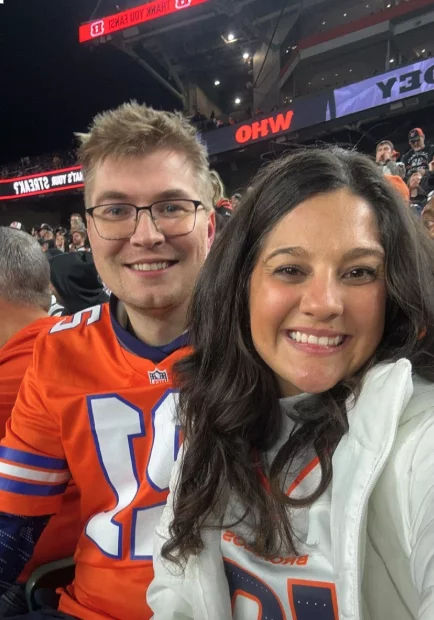
Chemo before her wedding; radiation treatment a few days after her wedding
With the cancer diagnosis coming on the heels of 2022, Haley began the new year with chemotherapy.
She continued to work her dental hygienist job throughout the ordeal, undergoing four rounds of chemo beginning in February 2023, followed by surgery in May, all at the UCHealth Cancer Care and Hematology Clinic – Cherry Creek.
During her chemo regimen, Braden and her parents would travel with her from Pueblo to Denver every Thursday for her treatment, returning later that day so she could rest and recover in time for work Monday morning.
“I wasn’t going to stay home. It helped me to get through it by working. It took my mind off things and helped give me some normalcy.”
Using a cold cap before and after chemo sessions helped preserve about 70% of Haley’s hair. A cold cap fits on the head like a swimming cap and reduces the loss of hair by protecting follicles from chemo drugs. The hair she lost grew back curly like the rest, which she was happy about.
“The cold cap wasn’t fun, but I wanted to save my hair, and it did exactly what it was supposed to do,” Haley said. “I wasn’t nauseous too much. The worst part was being emotionally drained, although being so young helped.”
While Haley was getting chemo, Braden was at her side to ease her discomfort when and where he could. That included providing plenty of blankets, books and snacks afterward so she could “focus on her fight.”
“I never wanted to say, ‘I knew what she was going through.’ I didn’t. So, I became a good listener and would reinforce the things that made her more comfortable,” Braden said.
Haley’s surgery later that spring entailed a lumpectomy and removal of surrounding lymph nodes.
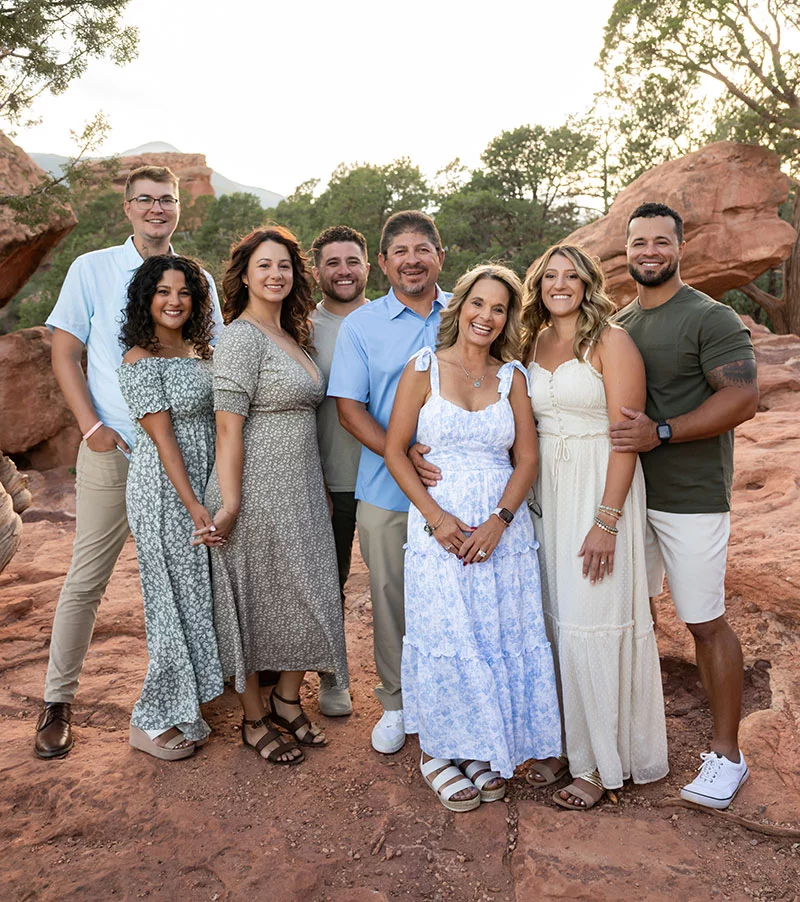
Finally, with her chemo and surgery behind her, Haley and Braden married a few months later in August 2023 in Pueblo surrounded by friends and family.
“It was a beautiful day and one that I will remember for my entire life, all thanks to Haley,” Braden said. “While she went through this fight, she still did all the planning for our wedding. She still says that not delaying the wedding from the original planned date was the best idea. It kept her mind off all the negative and gave her something to look forward to. Light at the end of the tunnel, if you will.
“On the wedding day, she wore a wig, and if you did not know she went through chemotherapy, you would have no idea that was not her real hair. She is always beautiful, but to see her again with her full confidence on her wedding day will be a memory I cherish for the rest of my life.”
Unfortunately, Haley couldn’t allow herself much time to rest and relax as a newlywed, since a few days later she began the first of 30 daily radiation treatments at UCHealth Cancer Center – Pueblo.
Radiation oncology entails using high-energy radiation to treat cancer after surgery to reduce the odds of cancer reappearing locally in the breast, surrounding tissue or lymph nodes, said Dr. Suraj Singh, Haley’s radiation oncologist. Aside from her skin getting a little “sunburned,’’ she used plenty of moisturizer and a stepped-up skincare regimen to counter any side effects of the radiation.

“She was fortunate to have a great support system and good guidance. She is doing so well now.”
Haley and Braden are hopeful about their future
While the difficult physical aspects of her cancer treatment are over, Haley is still dealing with its aftermath and undergoes ultrasounds every six months.
“It’s always stressful going into the doctor’s office, but I’ve already been through the worst of it, and this way, if anything is found, it will be early.”
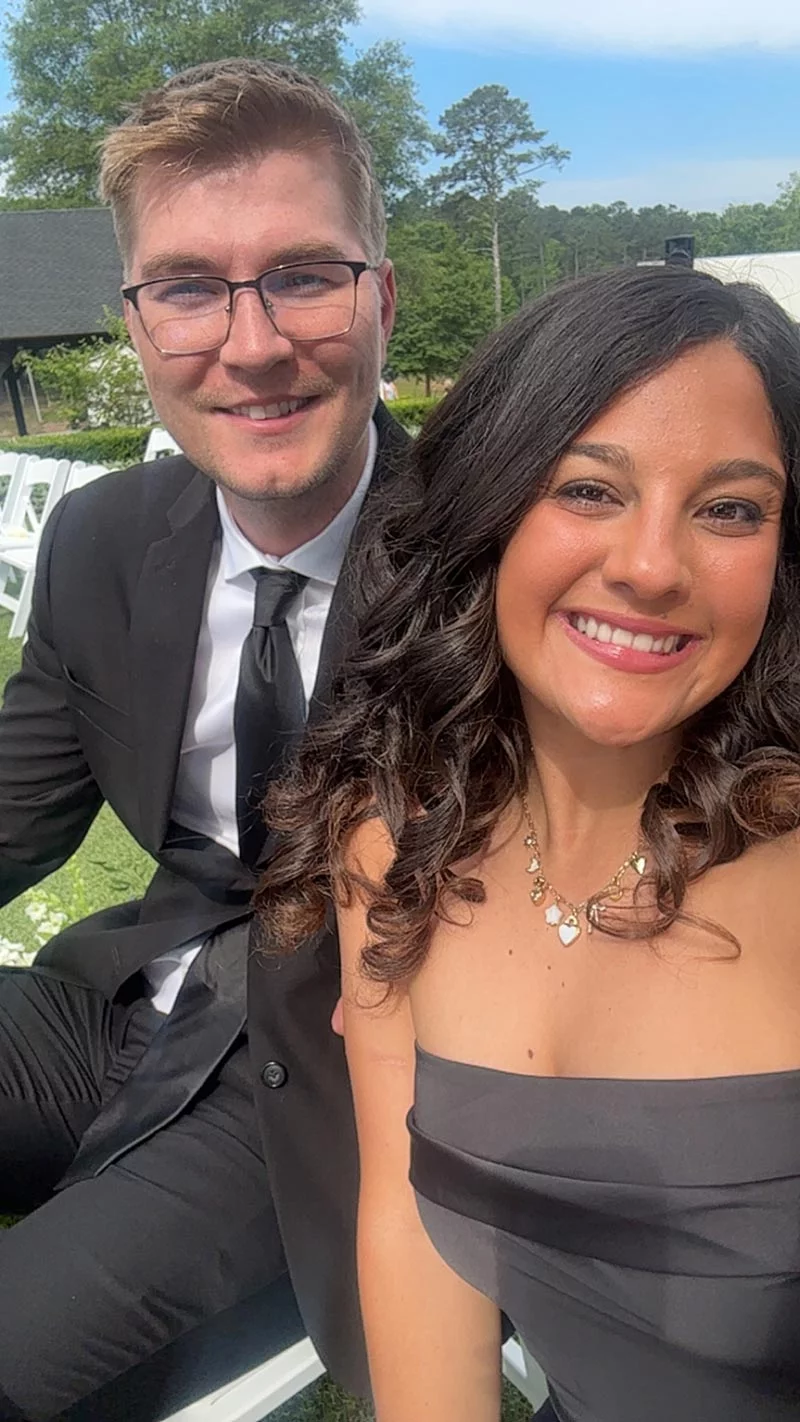
Haley’s doctors credit her diligence and discipline for how well she has progressed.
“She’s had a very good attitude about the situation, she’s been a good advocate for herself, and she’s always on top of her treatments and doing things on time,” said Dr. Shin Yin Lee, Haley’s oncologist at UCHealth Cancer Care and Hematology Clinic – Memorial Hospital Central in Colorado Springs.
After Haley’s radiation treatments, she was on a regimen of drugs with the goal of reducing the odds of her cancer recurring. She concluded a year’s worth of injections of a drug called Phesgo that targets a protein that promotes cancer cell growth. She also was taking hormone-suppressing medication, but she has tapered off those drugs as she doesn’t want it to affect her fertility.
Young women like Haley who have conquered cancer face additional stress and tough decisions when it comes to ongoing cancer treatment that includes hormone-suppressing medication, vs. them not wanting to put their fertility at risk.
To that end, she is working with doctors at the Young Women’s Breast Cancer Translational Program at the Anschutz Medical Campus.
The program has been providing unique care to women 45 and younger with breast cancer, and conducting ground-breaking research since its inception in 2004, with a strong focus on living a full life after breast cancer.
With help from her medical team, Haley is excited to continue a normal life.
“Hopefully, we’ll start a family soon. We’ve been through a lot of obstacles, but we did it and now we are moving forward,’’ she said.
The couple stays active playing golf, board games and hanging out with friends and family. At their young age, they have been tested by both luck and fate, yet have faith in each other and the future.
“It’s important not to forget all of the good in life,” Braden said, adding that he admires his wife’s determination, strength and humor. “If you let the negative overcome your day-to-day life, you will forget to count your blessings along the way.”
Along with wanting other women her age to know the importance of preventative breast screening, Haley wants her peers to listen to their instincts.
“My advice is not to wait for anyone else but yourself, because you know if something is wrong. If people say you’re young or you’re overreacting, don’t listen to them. It didn’t feel right to me, and I advocated for myself. It could happen to anyone.”
